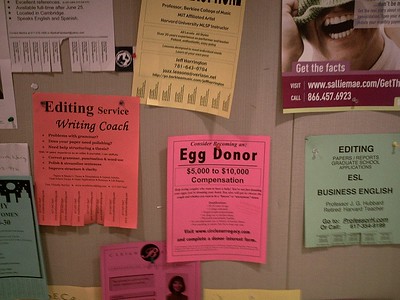The Egg Hunt
By Katherine Plumhoff,
Teen Vogue
| 04. 09. 2021
Ads seeking egg donors target Ivy League, mostly white students. Is that ethical?
"Editing or Eggs" by daithifortytwo is
licensed under CC BY-NC-SA 2.0
The first advertisement was slid under the door of Maggie’s* Ivy League dorm room. The quarter sheet of thin paper featured a woman’s silhouette, leaping with open arms over an explosion of rainbow-hued long-tailed ovals and flowers. It implored her to “Be Eggceptional. Help a family’s dream come true. Become an egg donor today.”
The freshman threw it away without thinking much of it. Then the egg donation ads went virtual, a constant presence on her social media for three years until one on Facebook made her look twice. It said she could make up to $100,000 as an egg donor — so she clicked on it.
Ads for egg donation have long targeted young women from top-tier schools. But now, as ads aren’t relegated to dorm room distribution or alumni magazine classifieds and instead follow potentially interested donors around online for years, their idyllic depiction of egg donation begs a few questions: Are they helpful, informing potential donors about life-changing amounts of money? In targeting highly-educated and...
Related Articles
By Diaa Hadid and Shweta Desai, NPR | 01.29.2026
MUMBRA, India — The afternoon sun shines on the woman in a commuter-town café, highlighting her almond-shaped eyes and pale skin, a look often sought after by couples who need an egg to have a baby.
"I have good eggs,"...
By George Janes, BioNews | 01.12.2026
A heart attack patient has become the first person to be treated in a clinical trial of an experimental gene therapy, which aims to strengthen blood vessels after coronary bypass surgery.
Coronary artery bypass surgery is performed to treat...
By Staff, ScienceDaily | 01.05.2026
Scientists at UNSW Sydney have developed a new form of CRISPR technology that could make gene therapy safer while also resolving a decades-long debate about how genes are switched off. The research shows that small chemical markers attached to DNA
...
Following a long-standing CGS tradition, we present a selection of our favorite Biopolitical Times posts of the past year.
In 2025, we published up to four posts every month, written by 12 authors (staff, consultants and allies), some in collaboration and one simply credited to CGS.
These titles are presented in chronological order, except for three In Memoriam notices, which follow. Many more posts that are worth your time can be found in the archive. Scroll down and “VIEW...




